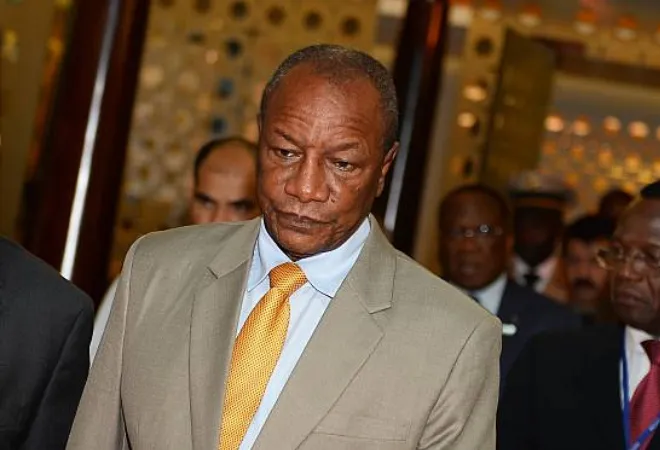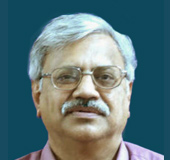
The military coup d’état in Guinea on the 5th of September, 2021 and the consequent ouster as well as arrest of the 83-year-old former President Alpha Condé is a significant development in the politics of the west African region. Col. Mamady Doumouya, Head of the Special Task Force, seized power and dissolved the constitution. Condé, according to his opponents, was running an incompetent and authoritarian regime. Although the GDP of Guinea was growing at an average of 5 percent for the past five years, 70 percent of the people were earning less than US $3.20 a day. The state of roads, hospitals, and infrastructure was worsening. More importantly, Condé was violating human rights while handling his opponents. Col. Mamady Doumouya mentioned poverty and corruption as the crucial reasons for the coup. With the fall of the Condé regime, the military will form a proper government within the next few weeks. However, international organisations such as the United Nations (UN), the African Union (AU) as well as Economic Community of the West African States (ECOWAS) have condemned the coup and demanded the release of Condé. The ECOWAS went as far as to suspend Guinea from its membership and offered to send mediators to resolve the crisis. One of the major consequences of the fall of the Condé regime is the resultant uncertainty in the supplies of bauxite and iron ore. Guinea has the largest bauxite reserves in the world, which is the main source of aluminium; bauxite prices have spiked to a 10-year high in the Metal Exchange as the coup has jolted the bauxite market.
Condé’s work in Guinea
In the west African region, military coups are not uncommon. Recently, within less than a year, Mali had two military coups, in August 2020 and May 2021, respectively. Similarly, Chad also saw the advent of military dictatorship in May 2021. Guinea Bissau has also been prone to recurrent military coups since its independence in 1974. Developments in Guinea need not be separated from the burgeoning political culture within the region. However, it needs to be underscored that Condé was the first democratically-elected President of the Republic of Guinea in 2010. Before taking over as President, Condé had an illustrious career. In Paris, he had studied public law in prestigious institutions such as Sorbonne University and Institute of Political Studies. He had also worked as a professor of Public law at Sorbonne University. He was active in student movements and headed the Federation of Students of Black Africa in France (FEANF). He had opposed the oppressive regime of Ahmed Sékou Touré (1958-84) in Guinea vigorously, for which he was sentenced to death in absentia in 1970.
One of the major consequences of the fall of the Condé regime is the resultant uncertainty in the supplies of bauxite and iron ore. Guinea has the largest bauxite reserves in the world, which is the main source of aluminium; bauxite prices have spiked to a 10-year high in the Metal Exchange as the coup has jolted the bauxite market.
After Condé’s return to Guinea from France in 1991, as a leader of his political party, namely, the Rally of Guinean People (RPG), he had spent decades in the Opposition and had run for the presidency unsuccessfully against the then President Lasana Conté (1984-2008) in 1993 and 1998. In view of Condé’s academic background and ostensible disposition against authoritarianism, people had hopes in his commitment to pursue politics of democracy and development based on freedom of thought and the rule of law.
Condé’s tenure was not without achievements since he paid attention to the developmental agenda of Guinea as well as Africa. Within a year of assuming office, in 2011, he began to pay attention to the mineral sector and sought advice from his friend George Soros, a financial magnet, on how to regulate the sector by inviting him to Guinea. He worked to evolve a mining code to give the state a 33 percent stake in mining projects from the existing 15 percent. A new mining code was to include a commitment to the Extractive Industries Transparency Initiatives (EITI). He strove to control bribery and corruption in the sector. Condé also worked to boost electricity access all over Guinea and he overhauled the military while Guinea was facing the Ebola pandemic acutely from 2014-2016. To counter Ebola, his government had increased taxes that raised fuel prices by 20 percent. Further, he had built the Kaleta power project in the Konkoure river basin in 2015, which was the largest power plant in Guinea. In the same basin, the Souapiti hydropower station was supposed to be completed and made operative by 2021. During his tenure as the Chairperson of the AU (2017-2018), Condé had emphasised on how African countries needed investments and not donations to improve infrastructure. Guinea, under his leadership, was active in the ECOWAS. In the political realm, Condé not merely conducted parliamentary elections in 2013 but was also re-elected as the Guinean President for the second term, as he won 58 percent of the votes, in 2015.
Condé’s tenure was not without achievements since he paid attention to the developmental agenda of Guinea as well as Africa. Within a year of assuming office, in 2011, he began to pay attention to the mineral sector and sought advice from his friend George Soros, a financial magnet, on how to regulate the sector by inviting him to Guinea.
A few years before his second term was coming to an end, Condé nervously began to cling to power and started manoeuvring to prepare himself for the third term. The then Constitution did not have any provision for the third term and, therefore, he decided to introduce a new Constitution in March 2020 by holding a referendum that made him eligible for the third term. In a concurrently held election for the unicameral Parliament, the RPG captured 79 out of 114 seats, which had strengthened Condé’s claims for Presidency even further. Owing to his ambition to serve a third term, Condé’s authoritarian style of functioning based on harsh treatment of citizens involved a relentless crackdown on any opposition, blatant violations of human rights and arbitrary arrests of his opponents, which did not escape Amnesty International’s watchful eye. Moreover, the report of Freedom House on the functioning of democracy in Guinea, brought out in 2021, had offered a critical overview of his regime with reference to political rights, civil liberties, pluralism and political participation, and an overall functioning of the government. In order to perpetuate his rule, Condé had no qualms in obtaining support from external powers such as Russia. Russia has emerged as the major external actor in Guinea’s extractive sector. Rusal, Russia’s largest aluminium producer, has developed an expansive interest in Guinea’s bauxite mining. Prior to the completion of his second term in 2019, Alexander Bregatze, a Russian envoy to Guinea, had suggested that the Guinean Constitution be amended and Condé be given the third term. In his desperate bid to recapture power, Condé went far enough to obtain support from Russia during the elections which almost turned Guinea into Russia’s client state.
Cellou Dalenin Diallo, the main opposition leader who had once served as the Prime Minister of Guinea from 2004-2006, was not convinced with the outcome of what was deemd to be an unfairly conducted election. He rose to challenge the results and condemned the irregularities in the electoral process as well as Condé’s victory.
The elections in Guinea were held under the new Constitution in October 2020. Guinea’s roughly 13 million people are divided into more than two dozen ethnic groups. However, amongst these, Malinké, Fulani, and Soussou are the most predominant groups. Condé hails from the Malinké ethnic group constituting around 30 percent of the population. In contrast, Cellou Dalenin Diallo, who headed the Union of Democratic Forces of Guinea (UDFG), comes from the Fulani ethnic group, which constitutes roughly 40 percent of the population. The electoral campaign was marred by violent protests as well as hate speeches related to ethnicity. Eventually, in November 2021, the Constitutional Council confirmed the outright victory of Condé over Cellou Dalenin Diallo as the former secured 59.5 percent of votes. This urge to prolong one’s tenure is quite common in west African countries. Like Condé, President Alassane Quattara of Ivory Coast had succeeded in getting a disputed third term through a similar method in December 2020. Guinea had only taken a leaf out the book of the Ivorian President.
Cellou Dalenin Diallo, the main opposition leader who had once served as the Prime Minister of Guinea from 2004-2006, was not convinced with the outcome of what was deemd to be an unfairly conducted election. He rose to challenge the results and condemned the irregularities in the electoral process as well as Condé’s victory. Subsequently, he also welcomed the military coup and described it as a patriotic act. He is hoping that the military will eventually conduct free and fair elections in the near future. Hence, he has shown willingness to participate in the transitional government.
To conclude, even if military coups are common in Africa, manipulation to stay in power via constitutional amendments is also becoming a new normal in the west African region. Condé had assumed power after the long-serving and dictatorial regimes of Touré and Conté. He had enlivened the hope of democratic governance in Guinea. However, Condé succumbed to the temptation of continuing for more than two terms, has indulged in authoritarian malpractices, and has shattered the hopes of democracy in Guinea. Whether the present military regime conducts free and fair elections in Guinea remains to be seen.
The views expressed above belong to the author(s). ORF research and analyses now available on Telegram! Click here to access our curated content — blogs, longforms and interviews.




 PREV
PREV


